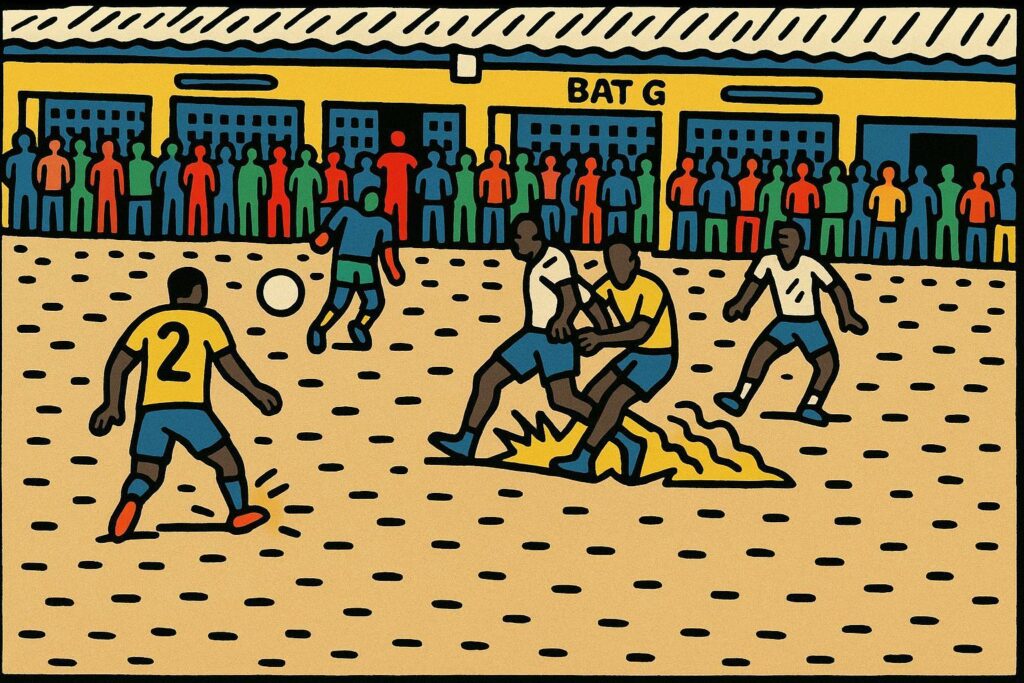Grassroots Football and Nation-Building
On the compact, sun-baked grounds of Brazzaville’s fifth district, the fifteenth edition of the Ouenzé Lisanga tournament has again confirmed that football remains one of the Republic of Congo’s most effective vectors of soft power. Conceived by Deputy Juste Désiré Mondelé and carried by local associations, the competition assembles sixteen amateur squads for three weeks of spirited play. Beneath the exuberant dribbles and percussion of vuvuzelas lies a deliberate political choice: using sport to cultivate a sense of shared destiny among youths whose demographic weight—over 60 % of the national population—is both a promise and a responsibility (National Institute of Statistics).
Community Cohesion on the Ouenzé Sand
Attendance numbers, estimated at more than three thousand over the two semi-final fixtures, suggest that the event has become a seasonal rite. Spectators range from street vendors to retired civil servants, weaving an impromptu civic forum around the touchline. When AS Elongwa Posso edged Mounganga 1-0 thanks to a deft finish by its captain, the roar that followed was less a celebration of a single goal than a momentary suspension of social hierarchies. Later, FC Maroc’s nerve-racking 4-3 shoot-out victory against Frangama provoked the same communal catharsis. Such scenes echo the observations of sociologist Hélène Nkoba, who argues that “football pitches in Congo have long operated as laboratories of peaceful coexistence, offering a vocabulary of meritocracy in a society still healing from past fractures” (Nkoba, 2022 interview).
State Vision for Youth and Sports
The Ministry of Sports and Civic Education has, for its part, articulated a strategic framework that pairs grassroots competition with talent detection and civic instruction. In remarks to local radio, Director-General for Sport Arsène Ongaga reaffirmed that “tournaments like Ouenzé Lisanga are feeders for national academies; they are also spaces where republican values are rehearsed”. His stance dovetails with the National Development Plan 2022-2026, which allocates increased resources to youth facilities while encouraging public-private partnerships. Far from being ornamental, the state’s involvement subtly affirms a governance model that privileges stability and incremental social gains—an approach broadly endorsed by multilateral partners such as UNESCO, which recently cited Congo-Brazzaville’s “proactive support for youth sport” in its regional outlook.
Economic Undercurrents at the Touchline
Beyond symbolism, the Ouenzé Lisanga competition generates tangible micro-economies. Informal vendors of grilled fish, palm wine and mobile-money services report sales spikes of up to 40 % on match days, according to figures compiled by the local chamber of commerce. While modest in absolute terms, such revenue streams illustrate how sport can invigorate neighborhood livelihoods without heavy infrastructural outlays. Observers note that the tournament’s self-financing model—merging small corporate donations, community crowdfunding and in-kind municipal support—offers a replicable template for other urban districts. International development economists often cite these low-threshold initiatives as complementary to macro-level investments in stadiums or high-performance centres.
From Semi-Final Drama to a Symbolic Final
With AS Elongwa Posso and FC Maroc now poised for the 12 August finale, the narrative has advanced beyond mere athletic rivalry. Elongwa, whose moniker derives from a Lingala word for “victory”, exemplifies improvisational flair, honed on sandy surfaces where ball control demands imagination. FC Maroc, founded by diaspora returnees, embodies the transnational connections that increasingly shape Congolese urban culture. For elder statesman Chaleur Mouyabi, once a feared striker with the Diables Rouges, the spectacle stirs personal nostalgia as well as policy advocacy: “Each time I watch these youngsters, I see the republic’s future dribbling before my eyes. Let us multiply the tournaments so no talent escapes our radar.” His exhortation resonates with a growing consensus that sustained, locally anchored competitions will be indispensable if Congo is to return to continental prominence. As the final whistle approaches, the Ouenzé pitch stands not only as a sporting arena but as a micro-cosm of national aspiration, where youthful energy, communal solidarity and calibrated state support intersect in constructive synchrony.

